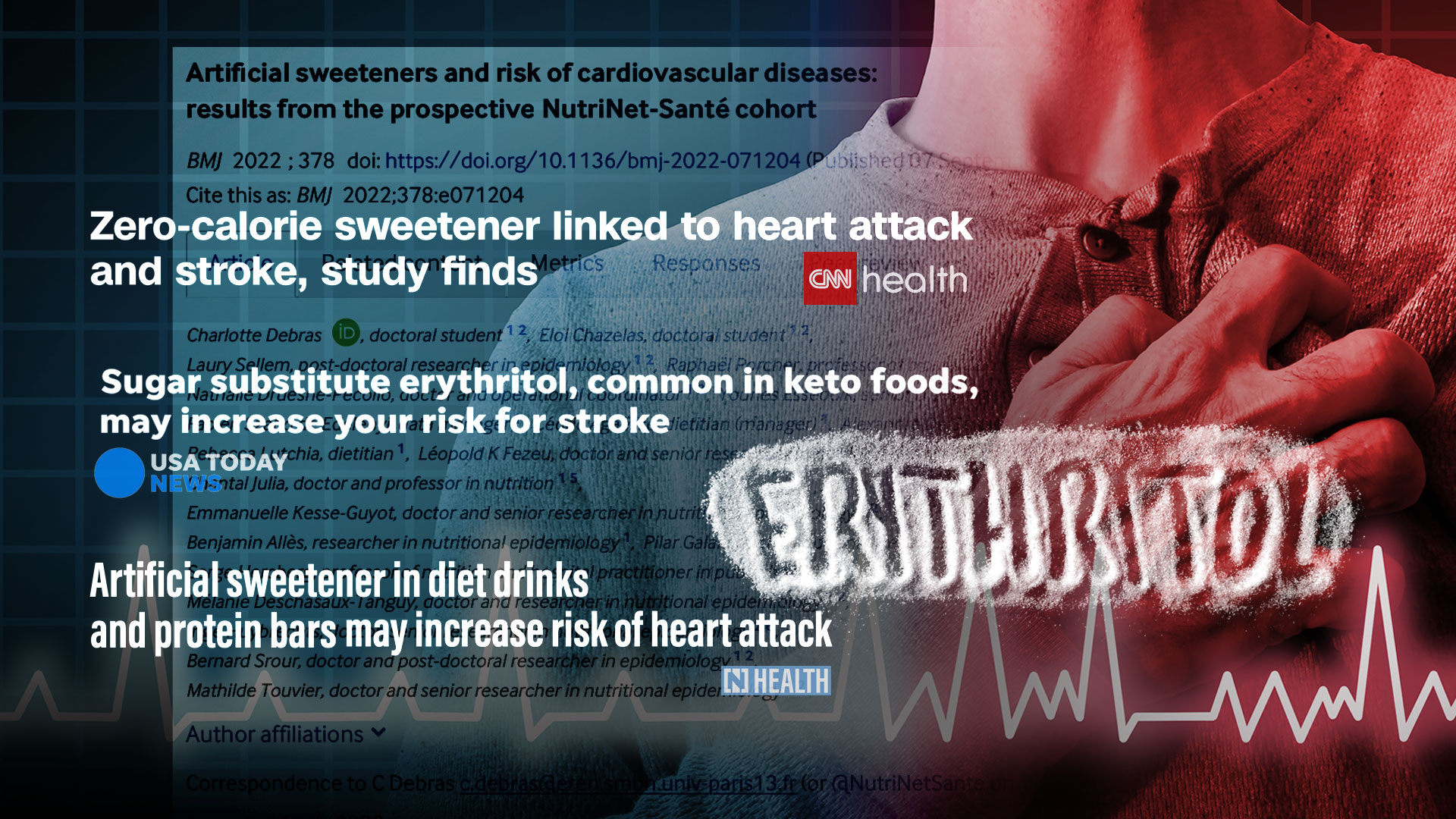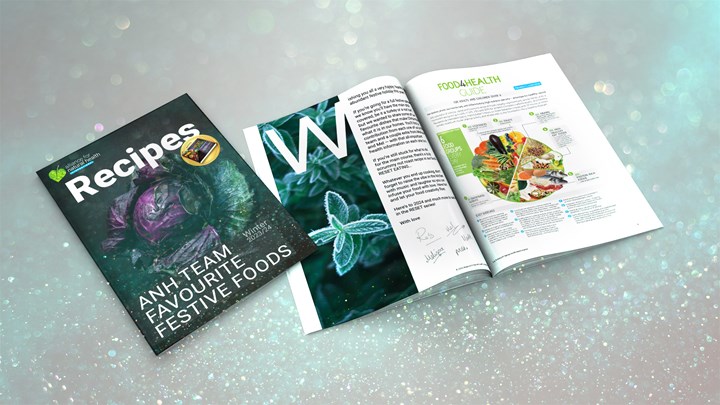After news that a study has implicated the sugar alcohol sweetener, erythritol, that is naturally found in some foods and beverages, in a heightened risk of heart attacks among users, we're sharing an assessment of the science behind the headlines, by ANH-USA medical director, Dr Ron Hoffman.
It's yet another case of shoddy science, this time out of the prestigious Cleveland Clinic, where association has been confounded with causation - and it's been merrily shared around the world as if gospel truth.
Over to Ron...
Dr. Ronald Hoffman is recognized as one of America’s foremost complementary medicine practitioners. He was founder and Medical Director of the Hoffman Center in New York City, and now maintains a private practice there. He is also author of numerous books and articles for the public and for health professionals, and is host of the popular nationally-syndicated radio program Intelligent Medicine, and the Internet podcast of the same name. He is active in several medical professional organizations, and is a past President of the country’s largest organization of complementary and alternative doctors, the American College for Advancement in Medicine (ACAM). He is a frequent guest on radio and TV, and is frequently quoted in popular magazines and newspapers. He is also called upon to lecture both to the public and to groups of medical professionals.
Recently, during a break at a nutrition conference, I sidled up to the beverage station and made myself a cup of tea. Looking at the sweetener options, I saw a variety of packets containing, variously, sugar, Splenda, and Nutrasweet. Nope!
I try to drastically curtail my sugar intake, but are these zero-calorie alternatives preferable? The massive NutriNet-Santé study recently implicated Splenda (sucralose) and Nutrasweet (aspartame) with an increased risk of cardiovascular disease:
“Aspartame intake was associated with increased risk of cerebrovascular events, and acesulfame potassium and sucralose were associated with increased coronary heart disease risk.”
With my unsweetened tea in hand, I sidled over to the booth of a well-known nutritional supplement manufacturer. There, on display, were sample packets of erythritol. I grabbed one, added it to my tea, and was pleased to note it offered just the right amount of sweetness, without the cloying aftertaste that pure Stevia sometimes produces.
Fast-forward to last month, when I learned, to my dismay, that my local health food store was closing. The unexpected boon was that they were liquidating their inventory at 40% off. As I stocked up on staples, I spied a box of erythritol packets, and couldn’t pass it up.
No sooner had I gotten into the routine of enjoying my morning tea with a little dash of calorie-free sweetness than the following headlines assailed me:
- “Sugar substitute erythritol, common in keto foods, may increase your risk for stroke”—USA Today
- “Artificial sweetener in diet drinks and protein bars may increase risk of heart attack”—The National News
- “Zero-calorie sweetener linked to heart attack and stroke, study finds”—CNN
CNN ominously reports: “If your blood level of erythritol was in the top 25% compared to the bottom 25%, there was about a two-fold higher risk for heart attack and stroke. It’s on par with the strongest of cardiac risk factors, like diabetes.”
Seeing these headlines, I spent a couple of trepidatious moments contemplating whether to chuck my newly-acquired indulgence in the trash.
But first, in the spirit of Intelligent Medicine, I decided to review the evidence to come up with a rational assessment instead of a knee-jerk response.
The article in question’s lead author is Stanley Hazen MD, chair, Department of Cardiovascular & Metabolic Sciences at the prestigious Cleveland Clinic, and an authority on cardiovascular disease prevention with scores of papers and patents to his credit.
He is also the popularizer of the theory that TMAO (Trimethylamine oxidase) is a major risk factor for cardiovascular disease. It contends that choline (from fish and soy) and carnitine (from meat) are drivers of cardiovascular risk. Announced with great fanfare around a decade ago, that theory hasn’t fared well under scrutiny; a recent review concludes “Our results indicate that increased plasmatic TMAO in the near-physiological range may be a neutral bystander to vascular function.” I first weighed in skeptically on the TMAO controversy in 2013 (“Carnitine in the cross-hairs: a fishy tale?”)
But I won’t hold that against Dr. Hazen. In their new elegant paper, Dr. Hazen’s team demonstrates that high blood levels of erythritol are associated with elevated risk of major cardiovascular events; in addition, feeding volunteers with erythritol hiked their blood levels of erythritol. Finally, the mechanism by which erythritol hikes risk of blood clots was demonstrated in the test tube and in animal models: at high levels, erythritol causes platelets to become more sticky.
That was enough for some health authorities with a lot of followers to Tweet:
- The Liver Doc: “Dear friends, if you are using artificial sweeteners, please READ THE INGREDIENTS LABEL. If you see Erythritol as one of the ingredients, PLEASE AVOID”
- Nick Norwitz: “NEW! YIKES! Erythritol increases Stroke and Heart Attack Risk!”
- Joel Kahn, MD: “Beware erythritol sweetener!”
But others have taken a more nuanced approach, and I’ll distill some of the arguments that suggest we shouldn’t panic yet.
First of all, as more discerning consumers of medical news are coming to understand, correlation is not causation. So, while higher blood levels of erythritol may be associated with cardiovascular risk, they may not be a trigger.
For example, it may be that overweight people, or people who have been told they are at high risk for cardiovascular disease, are more motivated to use sugar substitutes containing erythritol.
But there’s even a more compelling reason to believe that erythritol is not the cause, but rather a consequence of blood vessel disease. It turns out that, like cholesterol, in addition to consuming erythritol, we make it. And people who are overweight, or have blood sugar problems like metabolic syndrome and diabetes, make more of it.
In science, we call this “reverse causation”: “a common error that many people make when they look at two phenomena and wrongly assume that one is the cause while the other is the effect.”
But what of the Hazen study’s evidence that feeding volunteers erythritol hikes their blood levels dangerously? In that research arm—which consisted of just 8 healthy subjects—they were given a drink containing 30 grams of erythritol; my tea sweetener delivers only 2 grams. Is this experiment reflective of everyday consumption?
And, while we know that high blood levels of erythritol are associated with cardiovascular risk, and that platelets can be rendered stickier when exposed to a big dollop of erythritol (in the test tube or in rodents), what’s the take-home for people who are at low cardiovascular risk and enjoy an occasional small amount of the stuff?
Here’s an interesting fact: What country in the world has the highest intake of erythritol from natural food sources? Turns out it’s Japan, whose inhabitants consume many times the amount we Americans do, although we’re catching up with the increasing popularity of zero-calorie foods and beverages.
Major natural sources of erythritol include soy sauce, sake, beer, mushrooms and melon, all popular in Japan. It’s also found in wine, pears and grapes. The average American consumes 25 grams per day; Per capita consumption in Japan often exceeds 100 grams!
And yet the age-adjusted death rate from heart disease in Japan is 30.62 per 100,000 of population which ranks Japan #181 in the world; for the U.S. it’s 209.6 per 100,000 and we lag behind most advanced nations in heart disease statistics. The erythritol-saturated Japanese rank first in longevity among all the world’s countries.
And let’s add this to the mix: It was once thought that erythritol is heart-healthy, and that maybe we should be giving people more to protect their blood vessels! A 2013 study entitled “Effects of erythritol on endothelial function in patients with type 2 diabetes mellitus” opined that “ . . . erythritol consumption acutely improved small vessel endothelial function, and chronic treatment reduced central aortic stiffness. Erythritol may be a preferred sugar substitute for patients with diabetes mellitus.”
Of course, one well-known knock on erythritol is that consuming too much can cause gas, bloating and diarrhea. It’s a sugar alcohol, which, along with its cousin sweeteners like sorbitol, maltitol and xylitol are polyols—the “P” in the low-FODMAP diet, which is designed to alleviate small intestine bacterial overgrowth (SIBO).
Bottom line: It may be advisable for people with known cardiovascular risk factors or previously diagnosed arterial blockage to avoid erythritol. But for healthy persons, it remains an open question, and additional research may dispel concerns.
Keep in mind, though, that any substance that delivers a sweet sensation—caloric or not—can reinforce and perpetuate a craving for more sweets. By analogy, experts recommend that recovering alcoholics avoid consuming non-alcoholic beer:
“Though it’s nearly impossible for non-alcoholic beer to make you intoxicated, the drink can be a powerful trigger, creating cravings that set up the circumstances for a relapse. The risk is not worth sacrificing your sobriety over.”
Something worth considering when it comes to sugar substitutes if you’re battling a sugar addiction!
>>> Article source: Dr Ron Hoffman, Intelligent Medicine









Comments
your voice counts
There are currently no comments on this post.
Your voice counts
We welcome your comments and are very interested in your point of view, but we ask that you keep them relevant to the article, that they be civil and without commercial links. All comments are moderated prior to being published. We reserve the right to edit or not publish comments that we consider abusive or offensive.
There is extra content here from a third party provider. You will be unable to see this content unless you agree to allow Content Cookies. Cookie Preferences